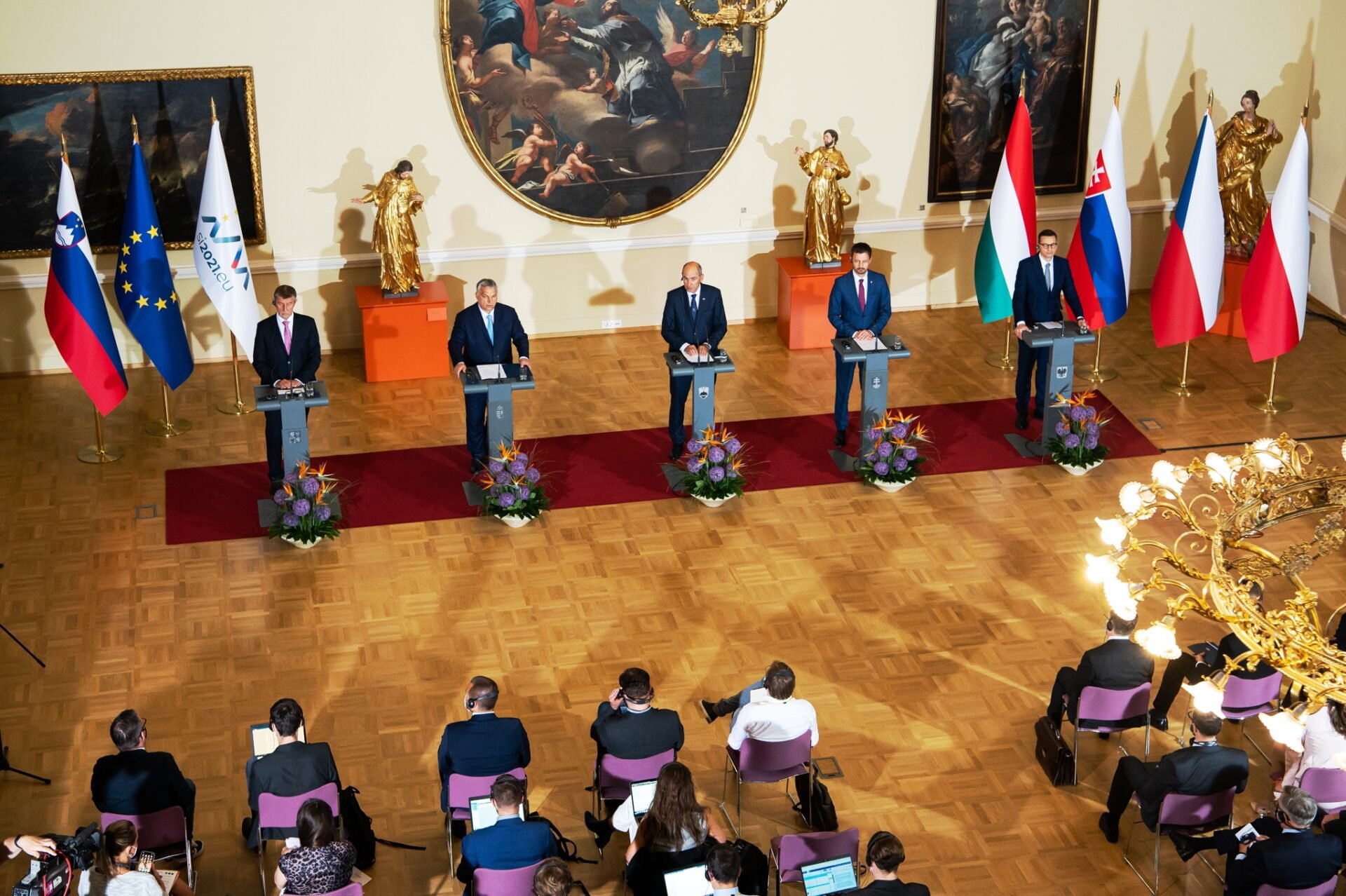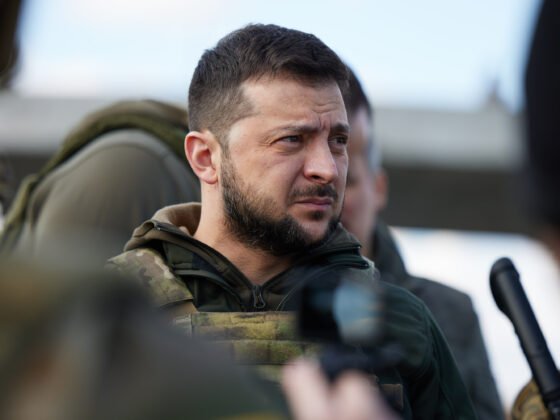The far-ranging consequences of the war in Ukraine are incalculable. The conflict has had reverberations spilling well beyond the borders of the two countries, from revisions to the European energy architecture to sharp increases in food prices across the world. Countries in the immediate vicinity of the conflict have been particularly impacted. Hungary and Poland initially stood out as two actors whose complicated relationship with Russia and the EU might result in benefits for the illiberal leaders running those two states.
This memo argues that the leaders in both countries, Hungarian Prime Minister and Fidesz party leader Viktor Orbán and Polish Law and Justice party leader and former Prime Minister Jarosław Kaczyński, used the war to overcome difficulties in their relationship with European institutions that had gotten increasingly adversarial during the pandemic while at the same time using the war to score domestic political points that allowed them to continue their stay in power. However, it challenges the view that rule of law issues were set aside in favor of cooperation during the conflict in order to show a united European front against Russia. It focuses specifically on issues in the treatment of refugees, presenting a united European front toward Russian aggression and how energy factors into these domestic and international positions toward Russia.
Domestic Illiberalism and International Engagement
It is important to examine the position of Hungary and Poland concerning the war in Ukraine. The leadership governing Budapest and Warsaw has embraced populism and illiberalism for years, and this ideological choice has resulted in domestic and international policies that diverge from the standards expected of EU members. In previous work, I show how this strategic illiberal position impacts economic policy. Here I discuss how the illiberal leaders in Hungary and Poland have extended the selective way in which they engage internationally with issues such as the war in Ukraine. Fidesz in Hungary and Law and Justice in Poland have used the war domestically to gain additional support for their regime and internationally to obtain further concessions from the EU as the organization was attempting to show a united front against Russian aggression.
Prior to the conflict in Ukraine, Hungary spent over ten years building an illiberal regime in the heart of Europe, starting with the 2010 elections. Since then, Fidesz has enacted extensive changes throughout the Hungarian economy and political system. In Poland, the illiberal actions of the Kaczyński regime began following the 2015 elections, even as these actions attracted mass protests and scrutiny from the EU.
As both these countries slid further down the illiberal route, it created friction with European institutions. As various domestic institutions within these countries, such as the media and the judiciary, were brought under the control of the state, the EU initiated discussions on the possibility of withdrawing the voting rights of these countries within EU institutions. Last year Poland decided to institute additional disciplinary rules against judges and declared that the country’s own laws had primacy over those of the EU—a direct contradiction to the membership agreement with the EU. These actions resulted in a daily EU fine of over 1.2 billion euros until the county complied. Warsaw refused to pay and even suggested stopping its payments to the EU budget. However, this would only hurt the country as Warsaw is still one of the biggest net recipients of EU funds. Moreover, in a show of illiberal solidarity, Hungary signaled very strongly that it would veto any attempt from the EU to further sanction Poland for its attacks on the judiciary. Additionally, troubles with the EU continued when Brussels did not grant the release of 24 billion euros from COVID-19 recovery funds.
At the beginning of 2022, both countries were in a highly contentious relationship with the EU while domestic politics was continuing on its illiberal path. When the war began, Orbán, head of Fidesz and prime minister since 2010, was in the middle of his reelection campaign. At that time, he joined the Europe-wide support for Ukraine by condemning Russia’s actions. The electoral campaign was an opportunity for the opposition to highlight the close association between Orbán and Russian President Vladimir Putin, which is why at the beginning of the conflict, the Hungarian prime minister decided to maintain “neutrality.”
Although the election was predicted to be close, in the end, Orbán and Fidesz won a fourth term in power by a landslide. When Orbán gave the first speech of the new government, he called the president of Ukraine one of the “opponents” he had to defeat during the campaign and returned to his long-standing support for Putin. Moreover, as the conflict continued, the Hungarian leader doubled down on this position and stated that the EU “should not side with the Ukrainians” but position itself between both Kyiv and Moscow.
Refugees and Domestic Politics in Hungary and Poland
For Poland, the start of the war also took place during a period of heightened tension with the EU. This is one of the reasons why Warsaw chose the extensive collaboration route. Compared to Fidesz, the Law and Justice party is quite critical of the Putin regime. This is due not only to the country’s memory of conflicts with Russia and its Communist past but also to the 2010 plane accident in Smolensk, when the entire diplomatic delegation set to attend the 70th commemoration of the Katyn massacre died, including Lech Kaczyński, the Polish president at the time (2005-2010) and twin brother of Jarosław Kaczyński. Both had co-founded the Law and Justice party. For these reasons, Poland showed support for the Ukrainian side when the conflict started and reinforced that support by opening its borders to the Ukrainians seeking refuge from the advancing Russian army.
Russia’s invasion resulted in one of the largest refugee crises in Europe since World War II. As of late January-early February, around 8 million Ukrainian refugees are in Europe. Another 5.9 million people are internally displaced, and about 2.8 million have gone to Russia. Poland took in the highest numbers in Europe, 1.5 million, followed by Germany, the Czech Republic, Italy, Spain, the UK, and France. Hungary is quite far down the list, having received about 33,000 Ukrainians. The Polish authorities and citizens opened their country and homes, and the parliament adopted new laws granting Ukrainian refugees access to the labor market, health care, and education services. Moreover, Warsaw provided significant military and other aid to Kyiv, including about 2 billion euros worth of tanks, modern artillery, anti-aircraft kits, strike drones, surveillance systems, and other military equipment.
This show of solidarity with Ukraine and with the united European response resulted in substantial initial goodwill from Brussels. Even though the rule of law issues and disputes on the judicial reforms were not solved, thanks to the open doors that Warsaw extended to Ukrainian refugees, the EU announced that it would unfreeze about 36 billion euros in pandemic help that had been held up by the rule of law violations of the previous year.
The presence of so many refugees has brought both benefits and challenges, not to mention criticism. Aizada Arystanbek and Caress Schenk contrasted (in a PONARS Eurasia policy memo) the treatment of different ethnic groups migrating in Eurasia and showed the existence of an ethnic hierarchy that many have accused Warsaw of promoting. While government and society have opened their doors to Ukrainian refugees, they were decidedly less welcoming during the Syrian refugee crisis of 2015. Even today, when Middle Eastern refugees from Ukraine seek asylum from the war in Poland, they are not as welcome as their European counterparts.
Energy Politics
An important dimension of the war in Ukraine comes from the energy links between Russia and Europe. Ukraine has been at the center of EU-Russia energy negotiations before. In the winter of 2008-2009, a failed energy negotiation between the two countries resulted in gas disruptions across Europe. Since then, the EU has tried to wean itself from its dependence on Russian energy without success. The conflict in Ukraine brought the extent of that dependence back on the agenda. Prior to the war, about half of Russia’s oil exports were directed toward Europe, representing $10 billion in transactions each month. Western European countries and European institutions agreed on a joint response that reduced the importance of Russian energy imports. Combined with extensive economic sanctions, the reduced energy purchases were meant to cut Moscow from access to financial resources that would go into its war effort.
While many European countries agreed to a partial energy embargo in spite of the economic cost for their own economies, Hungary, Slovakia, and the Czech Republic were exempt. Poland, on the other hand, has continued its focus on collaboration with the EU. As the EU was banning Russian oil, Warsaw agreed to stop importing Russian energy despite the extensive dependence of the Polish market on Russian energy. While the initial imposition of the oil ban has functioned, the price of natural gas and other commodities has continued to skyrocket, bringing economic instability to regions beyond the EU.
Conclusions
As the war continues, the initial appreciation for the joint effort that Hungary and Poland showed has cooled. In Hungary, the chill started as soon as Orbán won a new term in office and was secure in a return to the pre-war status quo. This recommitment to illiberal policies became obvious when days prior to Hungary winning its exemption from participating in the oil embargo, Orbán was granted new emergency powers under the pretext of security concerns due to the conflict in Ukraine. On the other hand, as Poland continues to be welcoming to Ukrainian refugees, the EU’s leniency on judicial reforms has subsided.
Even as the Polish political party boss openly criticized Orbán’s pro-Russian sympathies, goodwill from the EU was running low. The European Commission renewed its requests for solutions to the judicial reforms. Although in May, the Polish parliament rolled back some of the changes to the judiciary disciplinary chamber, the EU did not consider the new measures to be enough. The daily fines imposed when the law was first adopted have now amounted to more than 366 million euros (the Polish government has requested suspension of the fine). More importantly, the COVID recovery funds have still not been released. To finally convince the EU, in January 2023, Polish lawmakers approved a new law that could unblock the European funds.
While presenting a united European front to Russia has been important in the early days of the conflict, it seems that the EU’s ability to rally support from its largest member countries, such as Germany and France, has made the support of Hungary and Poland not important enough to overlook the continued deterioration of democratic norms. However, this strong European position toward rule of law abuses in these countries has not yet been put to the test of a prolonged conflict in Ukraine.
Paula Ganga is Assistant Professor of Political Economy at Duke Kunshan University, China, and Visiting Fellow at the Center for Russian, East European and Eurasian Studies at Stanford University.











